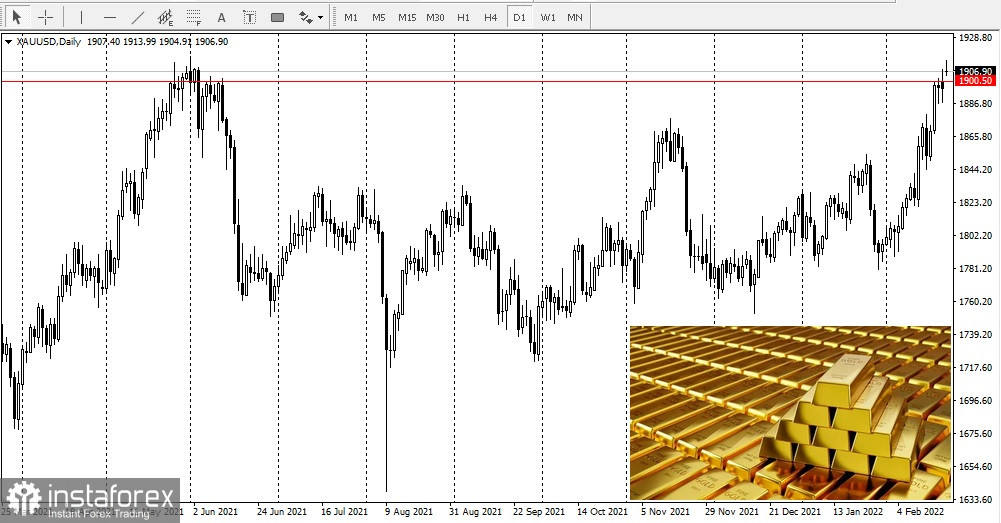
The precious metals market remains at the mercy of geopolitics as gold prices surged above $1,900 an ounce overnight.

On the night of the weekend to Monday, prices also rose to $1,910.80 per ounce, apparently due to the fact that Russia and Belarus announced the extension of military exercises, which should end on Sunday.
However, after French President Emmanuel Macron offered to hold talks between Russia and the United States, prices fell from session highs.
Most analysts believe that if geopolitical tensions remain elevated, gold prices have a good chance of holding gains above $1,900 an ounce. On the other hand, analysts also point out that when tensions begin to ease, gold prices could easily lose all of their recent gains.
According to Blue Line Futures chief market strategist Phillip Streible, geopolitical tensions account for about 2% of gold's recent move. With tension easing, gold could drop to $1,850.
Ipek Ozkardeskaya, senior analyst at Swissquote, believes that this week the dynamics of gold prices will depend on the ongoing events in Eastern Europe.
However, some analysts are ignoring the market uncertainty between the U.S. and Russia and continue to focus on the threat of inflation.
David Song, market strategist at DailyFx.com, said if the Personal Consumptions Expenditures (PCE) Index shows that inflation rose more than expected last month, then prices for the yellow metal could rise to $1,917 an ounce.
Also, according to most Western analysts, gold will remain an attractive asset if the U.S. Central Bank lags behind the inflation curve, keeping real interest rates negative.
Hedge funds are again considering gold as a safe haven. According to the latest data from the Commodity Futures Trading Commission, the growth of geopolitical concerns again makes gold an attractive safe-haven asset.
According to commodity analysts at Societe Generale, the latest CFTC report showed that money managers bought $7.1 billion worth of gold last week. The French bank said rising inflation worries and geopolitical uncertainty in Eastern Europe are fueling the recent surge in gold purchases.
The CFTC disaggregated Commitment of Traders Report for the week of February 15 showed money managers increased their speculative gross long positions in Comex gold futures by 34,296 contracts to 151,530. At the same time, short positions fell by 3,943 contracts to 43,824.
Gold's net length now is 107,706 contracts. This is the first time since mid-November that a net bullish position in gold has broken the 100,000 mark. Gold positions are up 55% in the past two weeks.
Matthew Simpson, market strategist at City Index, said gold's recent move above $1,900 is a sign that the bullish stance has only intensified. However, he added that prices remain sensitive to changes in the geopolitical landscape.





















